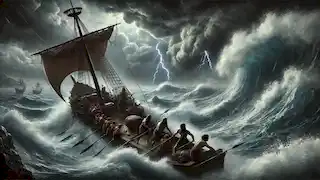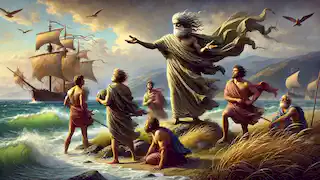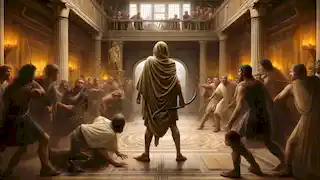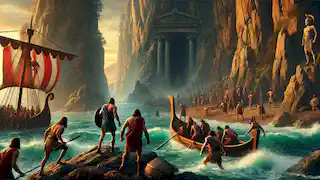In the heart of Greece, among the rolling hills and olive groves, there exists a tale passed down through generations, a story as ancient as the land itself. This is the legend of the Cyclops, a towering figure with a single eye in the center of its forehead, feared and revered by all who knew of it. For centuries, the Cyclops was the subject of myths and legends, stories that spoke of its brute strength, its solitary life, and the terror it inflicted upon those who dared to cross its path. Yet, beneath the surface of these tales lies a deeper truth—a story of betrayal, survival, and the unyielding will of one man who dared to challenge the mighty Cyclops. The sun blazed down upon the rocky shore, casting long shadows over the landscape. A group of sailors, their faces weathered and worn from weeks at sea, stood at the edge of their boat, staring up at the towering cliffs that rose before them. They had heard the stories of this island—an island said to be home to the fabled Cyclops. Yet, driven by desperation and the need for food and fresh water, they had no choice but to land. Among the crew was Odysseus, a man known for his cunning and bravery. He had led his men through countless perils, from the wrath of Poseidon to the temptations of the Sirens. But as he looked upon the towering cliffs and the dark cave that loomed above, even he felt a twinge of unease. “We must be careful,” Odysseus warned his men as they disembarked. “This island is said to be home to a giant, one with the strength of ten men and a hunger for human flesh.” His men exchanged nervous glances, but they trusted their leader. With weapons in hand, they began their ascent up the rocky cliffs, making their way toward the cave. The cave was enormous, its entrance wide enough to fit a dozen men standing shoulder to shoulder. Inside, the air was thick with the scent of livestock and the faint sound of snoring. As they ventured deeper into the cave, they saw it—a massive figure, sprawled out on the ground, fast asleep. It was the Cyclops, Polyphemus, son of Poseidon. The giant was as terrifying as the legends had described. His single eye was closed, his chest rising and falling with each breath. Around him, sheep and goats milled about, their bleating echoing off the cave walls. Odysseus motioned for his men to stay quiet as they crept forward, searching for food and water. But as they gathered supplies, one of the men knocked over a large jug, sending it crashing to the ground. The sound echoed through the cave, and the Cyclops stirred. Polyphemus opened his eye and sat up, his gaze falling on the intruders. With a roar, he reached out and grabbed two of Odysseus’ men, smashing them against the ground and devouring them in a matter of seconds. Odysseus and his remaining men scrambled back toward the cave’s entrance, but the Cyclops was too quick. He grabbed a massive boulder and rolled it across the cave’s mouth, trapping them inside. The men were terrified. They were trapped in a cave with a giant who could crush them with his bare hands. But Odysseus, ever the strategist, remained calm. He knew that brute strength would not save them; they would need to outwit the Cyclops. That night, as the Cyclops feasted on more of their comrades, Odysseus hatched a plan. He approached Polyphemus with a skin of wine they had brought from their ship. “Great Cyclops,” Odysseus said, offering the wine, “I bring you a gift. Drink and be merry, for your hospitality is unmatched.” The Cyclops, intrigued by the offering, took the wine and drank deeply. Soon, his eyelid grew heavy, and he slumped to the ground, falling into a deep sleep. While Polyphemus slept, Odysseus and his men sprang into action. They took a long wooden stake from the cave and sharpened it into a point. Then, with all their strength, they drove the stake into the Cyclops’ single eye. Polyphemus awoke with a scream, thrashing about the cave in agony. He reached for the men, but in his blindness, he could not find them. “Who did this to me?” the Cyclops roared. Odysseus, ever clever, responded, “No one! No one has harmed you!” Confused, Polyphemus stumbled to the entrance of the cave and moved the boulder, hoping to catch the men as they tried to escape. But Odysseus had anticipated this. He and his men tied themselves to the undersides of the Cyclops’ sheep, and when Polyphemus let the animals out to graze, they escaped with them. Once outside, they hurried back to their ship. As they set sail, Odysseus could not resist taunting the Cyclops. “Polyphemus!” he shouted. “It was not ‘No one’ who blinded you, but Odysseus, son of Laertes!” Polyphemus, enraged, hurled a massive boulder toward the sound of Odysseus’ voice, but it fell short, sending a wave crashing against the ship. The Cyclops, defeated, called upon his father, Poseidon, to curse Odysseus, ensuring that his journey home would be fraught with peril. As Odysseus and his men sailed away from the island of the Cyclops, they believed they had escaped the worst of their trials. But the gods had other plans. Polyphemus’ prayers had reached the ears of Poseidon, the god of the sea, and he was furious. The skies darkened, and the sea grew wild. Waves as tall as mountains crashed against the ship, threatening to tear it apart. The winds howled, and the men clung to the sides of the boat, praying for mercy. For days, they were tossed about on the sea, unable to find land. Their supplies dwindled, and despair set in. But Odysseus, ever determined, urged his men to hold on. “We have faced greater dangers than this,” he told them. “We will survive.” Finally, after what felt like an eternity, the storm subsided, and the men found themselves on the shores of a strange land. Exhausted and starving, they made camp, unaware that their trials were far from over. The land they had washed up on was the island of Aeolus, the keeper of the winds. Aeolus, impressed by Odysseus’ cunning, agreed to help him on his journey home. He gave Odysseus a bag containing all the winds, with strict instructions not to open it until they reached Ithaca. For days, they sailed smoothly, the wind at their backs. Ithaca was in sight, and Odysseus allowed himself a moment of hope. But while he slept, his curious men, thinking the bag contained treasure, opened it. The winds were unleashed, and they were blown back across the sea, further from home than ever before. Odysseus’ journey was far from over. He and his men faced countless more challenges—encounters with the sorceress Circe, the deadly Sirens, and the six-headed monster Scylla. Each trial tested their resolve, and many of Odysseus’ men did not survive. But Odysseus was determined. He had faced the wrath of gods, the treachery of men, and the monstrous strength of the Cyclops, yet he remained unbroken. His cunning and determination had seen him through the darkest moments, and he knew that if he could survive these trials, he would one day see his home again. Finally, after years of wandering, Odysseus found himself on the shores of Ithaca. His journey had taken him to the edges of the known world and beyond, but he had returned at last. But his trials were not over. Ithaca was not the home he had left. In his absence, suitors had flocked to his palace, vying for the hand of his wife, Penelope, and the throne of Ithaca. Odysseus, disguised as a beggar, entered his own home, biding his time until he could reclaim what was rightfully his. Odysseus had always been a master of disguise, and in his ragged clothing, no one recognized him as the king. He observed the suitors, watching as they feasted and squandered his wealth. His heart ached for Penelope, who had remained faithful, waiting for his return. With the help of his son, Telemachus, and a few loyal servants, Odysseus hatched a plan. He revealed himself at the right moment, taking the suitors by surprise. Armed with his bow, the weapon only he could wield, he struck down the suitors, reclaiming his home and his throne. The Cyclops, the winds, the monsters of the sea—none had been able to break Odysseus. He had outwitted giants, defied gods, and crossed vast oceans. And now, at last, he was home. : The Legend Lives On The legend of Odysseus and the Cyclops lived on, passed down through the ages, a tale of courage, cunning, and the indomitable will of one man. Though Polyphemus had been a fearsome foe, it was Odysseus’ wits that had won the day. The Cyclops, blinded and defeated, became a symbol of brute strength undone by cleverness—a reminder that even the mightiest can be brought low by those who dare to think and act with wisdom.The Island of the Cyclops

The Cunning of Odysseus
The Wrath of Poseidon

A Journey Home

The Return of the King

Epilogue
The Legend of the Cyclops
Reading Time: 8 min

About Story: The Legend of the Cyclops is a Legend Stories from greece set in the Ancient Stories. This Dramatic Stories tale explores themes of Courage Stories and is suitable for All Ages Stories. It offers insights. The cunning of Odysseus against the brute strength of the Cyclops in this ancient legend.

















